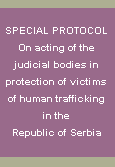Judicial Training Center
An institution providing training
The institution providing training in the judicial sphere is called the Judicial Training Centre. The Centre was founded by the Serbian Government, the Justice Ministry and the Serbian Society of Judges. Under its Statute, the Judicial Centre's managing authority is the Managing Board consisting of 11 members. Five members are appointed by the Justice Ministry, one of whom must be a judge and the other a prosecutor. The Serbian Society of Judges appoints another five members, while the eleventh member is appointed from the ranks of the Judicial Centre's staff. Legally seen, the Centre is a public institution/service with special powers.
Strengthening the Judicial Centre by adopting a legal framework
- A Judicial Reform Strategy was passed, proclaiming the Judicial Centre the chief protagonist in judicial education and envisaging its institutional strengthening and transformation into the National Institute. Under the commitment of the Serbian Government and the Justice Ministry to promote the role of the Judicial Centre, the Centre proposes one member of the Commission on the Judicial Reform Implementation Strategy.
- A Law on the Training of Judges, Public Prosecutors and Their Assistants was passed, under which the Judicial Centre is authorised to provide basic training courses and to adopt permanent training programmes and implement them.
- Under the Law on Minor Offenders and Criminal-Legal Protection of Minors, judges, prosecutors, attorneys, and police officers involved in minor offender or minor victim cases, must complete specialist training organised by the Judicial Centre. In accordance with the mentioned law, the Judicial Centre is authorised to issue a certificate on completed specialist training and only those who have been issued the certificate may take part in such cases.
- The Serbian Government adopted the Rules on Acquiring Special Knowledge on the Rights of the Child, under which all judges involved in family relations proceedings must attend a special training course organised and implemented by the Judicial Centre, on which they are issued a certificate. Under the Law on Family Relations, only those who have been issued the certificate can sit on the bench in such cases.
The main office of the Judicial Centre is in Belgrade, Karadjordjeva 48. Two regional offices are in Nis and Novi Sad.
The Judicial Centre is structured according to its programme orientation. It is thus divided into four sections:
- The Civil Law Section
- The Criminal Law Section
- The Commercial Law Section
- The Human Rights Section
Annual action programmes are proposed by the Programme Council and adopted by the Managing Board. The Judicial Centre working groups and heads of sections are in charge of programme and activity implementation.
The Judicial Centre has created an electronic database. It offers a better activity overview, registers all participants, including the seminars they attended and the topics they are interested in. The database also registers trainers and their fields of specialization.
More info you can find on JTC web site www.pcsrbija.org.yu.



